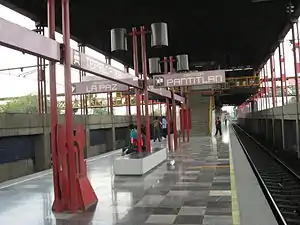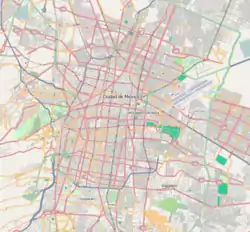Tepalcates metro station
Tepalcates is a station on the Line A of the Mexico City Metro.[2][3] It is located in the Iztapalapa municipality, to the east of downtown Mexico City.[2] In 2019, the station had an average ridership of 19,326 passengers per day.[4]
| STC rapid transit | |||||||||||||||||||||||||||||||||||||||||||||||||||||||||||||||||||||||||||||||||||||||||||||||||||
 Platform of Tepalcates | |||||||||||||||||||||||||||||||||||||||||||||||||||||||||||||||||||||||||||||||||||||||||||||||||||
| General information | |||||||||||||||||||||||||||||||||||||||||||||||||||||||||||||||||||||||||||||||||||||||||||||||||||
| Location | Iztapalapa Mexico City Mexico | ||||||||||||||||||||||||||||||||||||||||||||||||||||||||||||||||||||||||||||||||||||||||||||||||||
| Coordinates | 19°23′29″N 99°02′47″W | ||||||||||||||||||||||||||||||||||||||||||||||||||||||||||||||||||||||||||||||||||||||||||||||||||
| Line(s) | |||||||||||||||||||||||||||||||||||||||||||||||||||||||||||||||||||||||||||||||||||||||||||||||||||
| Platforms | 1 island platform | ||||||||||||||||||||||||||||||||||||||||||||||||||||||||||||||||||||||||||||||||||||||||||||||||||
| Tracks | 2 | ||||||||||||||||||||||||||||||||||||||||||||||||||||||||||||||||||||||||||||||||||||||||||||||||||
| Connections | |||||||||||||||||||||||||||||||||||||||||||||||||||||||||||||||||||||||||||||||||||||||||||||||||||
| Construction | |||||||||||||||||||||||||||||||||||||||||||||||||||||||||||||||||||||||||||||||||||||||||||||||||||
| Structure type | At grade | ||||||||||||||||||||||||||||||||||||||||||||||||||||||||||||||||||||||||||||||||||||||||||||||||||
| History | |||||||||||||||||||||||||||||||||||||||||||||||||||||||||||||||||||||||||||||||||||||||||||||||||||
| Opened | 12 August 1991 | ||||||||||||||||||||||||||||||||||||||||||||||||||||||||||||||||||||||||||||||||||||||||||||||||||
| Passengers | |||||||||||||||||||||||||||||||||||||||||||||||||||||||||||||||||||||||||||||||||||||||||||||||||||
| 2022 | 7,449,534[1] | ||||||||||||||||||||||||||||||||||||||||||||||||||||||||||||||||||||||||||||||||||||||||||||||||||
| Rank | 41/195[1] | ||||||||||||||||||||||||||||||||||||||||||||||||||||||||||||||||||||||||||||||||||||||||||||||||||
| Services | |||||||||||||||||||||||||||||||||||||||||||||||||||||||||||||||||||||||||||||||||||||||||||||||||||
| |||||||||||||||||||||||||||||||||||||||||||||||||||||||||||||||||||||||||||||||||||||||||||||||||||
| |||||||||||||||||||||||||||||||||||||||||||||||||||||||||||||||||||||||||||||||||||||||||||||||||||
| Location | |||||||||||||||||||||||||||||||||||||||||||||||||||||||||||||||||||||||||||||||||||||||||||||||||||
 Location within Mexico City | |||||||||||||||||||||||||||||||||||||||||||||||||||||||||||||||||||||||||||||||||||||||||||||||||||
| Area map | |||||||||||||||||||||||||||||||||||||||||||||||||||||||||||||||||||||||||||||||||||||||||||||||||||
Name and pictogram
The station takes its name from the nearby estate Unidad Habitacional Tepalcates. The name has its roots in the Nahuatl word "teplacatl" used to refer to any pot or vessel made out of clay or mud. The pictogram depicts the side view of a pre-Hispanic pottery bowl of the types made in Puebla and Tlaxcala.[2]
General information
The station was opened on 12 August 1991 along the other nine stations of Line A.[5]
Metro Tepalcates connects with the bus rapid transit stop of the same name of the Mexico City Metrobús Line 2; this stop is the eastern terminus of Line 2.
As every Line A station, except for Pantitlán, it is an at grade station in the median of Calzada Ignacio Zaragoza with the entrances on both sides of the road connecting to the station through two pedestrian bridges. Due to the design of the station, it has an island platform where passengers can take trains in both eastbound and westbound directions.
Ridership
| Annual passenger ridership | |||||
|---|---|---|---|---|---|
| Year | Ridership | Average daily | Rank | % change | Ref. |
| 2022 | 7,449,534 | 20,409 | 41/195 | +39.81% | [1] |
| 2021 | 5,328,315 | 14,598 | 46/195 | +6.88% | [6] |
| 2020 | 4,985,092 | 13,620 | 58/195 | −29.33% | [7] |
| 2019 | 7,054,067 | 19,326 | 92/195 | +11.71% | [4] |
| 2018 | 6,314,510 | 17,300 | 104/195 | +22.80% | [8] |
| 2017 | 5,142,008 | 14,087 | 122/195 | −17.62% | [9] |
| 2016 | 6,241,923 | 17,054 | 107/195 | +4.85% | [10] |
| 2015 | 5,953,370 | 16,310 | 105/195 | +10.27% | [11] |
| 2014 | 5,399,036 | 14,791 | 112/195 | +2.88% | [12] |
| 2013 | 5,247,805 | 14,377 | 118/195 | −16.81% | [13] |
| 2012 | 6,307,928 | 17,234 | 113/195 | −6.59% | [14] |
| 2011 | 6,752,766 | 18,500 | 106/175 | +31.31% | [15] |
| 2010 | 5,142,701 | 14,089 | 106/175 | – | [16] |
Exits
- North: Calzada Ignacio Zaragoza and General Esteban Baca Calderón street, Colonia Juan Escutia
- South: Calzada Ignacio Zaragoza and Avenida Telecomunicaciones, Unidad Habitacional Tepalcates
Station layout
| G | Street Level | Exits/Entrances |
| G Platforms |
Westbound | ← |
| Island platform, doors will open on the left | ||
| Eastbound | | |
Gallery
 Entry sign
Entry sign
References
- "Afluencia de estación por línea 2022" [Station traffic per line 2022] (in Spanish). Sistema Transporte Colectivo Metro. 2023. Archived from the original on 5 March 2023. Retrieved 5 March 2023.
- "Tepalcates" (in Spanish). Metro CDMX. Retrieved 30 April 2020.
- Archambault, Richard. "Tepalcates » Mexico City Metro System". Retrieved 6 August 2011.
- "Afluencia de estación por línea 2019" [Station traffic per line 2019] (in Spanish). Sistema Transporte Colectivo Metro. 2020. Archived from the original on 8 April 2020. Retrieved 3 May 2020.
- Monroy, Marco. Schwandl, Robert (ed.). "Opening Dates for Mexico City's Subway". Retrieved 5 August 2011.
- "Afluencia de estación por línea 2021" [Station traffic per line 2021] (in Spanish). Sistema Transporte Colectivo Metro. 2020. Archived from the original on 7 March 2022. Retrieved 7 March 2022.
- "Afluencia de estación por línea 2020" [Station traffic per line 2020] (in Spanish). Sistema Transporte Colectivo Metro. 2021. Archived from the original on 21 June 2021. Retrieved 21 June 2021.
- "Afluencia de estación por línea 2018" [Station traffic per line 2018] (in Spanish). Sistema Transporte Colectivo Metro. 2019. Archived from the original on 6 June 2019. Retrieved 7 April 2020.
- "Afluencia de estación por línea 2017" [Station traffic per line 2017] (in Spanish). Sistema Transporte Colectivo Metro. 2019. Archived from the original on 3 May 2020. Retrieved 3 May 2020.
- "Afluencia de estación por línea 2016" [Station traffic per line 2016] (in Spanish). Sistema Transporte Colectivo Metro. 2017. Archived from the original on 3 May 2020. Retrieved 3 May 2020.
- "Afluencia de estación por línea 2015" [Station traffic per line 2015] (in Spanish). Sistema Transporte Colectivo Metro. 2016. Archived from the original on 3 May 2020. Retrieved 6 May 2020.
- "Afluencia de estación por línea 2014" [Station traffic per line 2014] (in Spanish). Sistema Transporte Colectivo Metro. 2015. Archived from the original on 3 May 2020. Retrieved 6 May 2020.
- "Afluencia de estación por línea 2013" [Station traffic per line 2013] (in Spanish). Sistema Transporte Colectivo Metro. 2014. Archived from the original on 3 May 2020. Retrieved 6 May 2020.
- "Afluencia de estación por línea 2012" [Station traffic per line 2012] (in Spanish). Sistema Transporte Colectivo Metro. 2013. Archived from the original on 3 May 2020. Retrieved 6 May 2020.
- "Afluencia de estación por línea 2011" [Station traffic per line 2011] (in Spanish). Sistema Transporte Colectivo Metro. 2012. Archived from the original on 7 May 2020. Retrieved 6 May 2020.
- "Afluencia de estación por línea 2010" [Station traffic per line 2010] (in Spanish). Sistema Transporte Colectivo Metro. 2011. Archived from the original on 7 May 2020. Retrieved 6 May 2020.